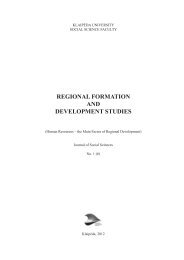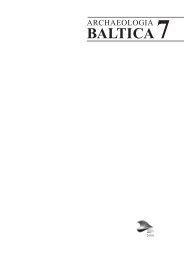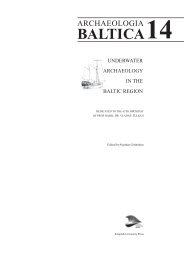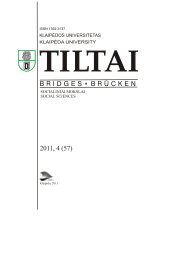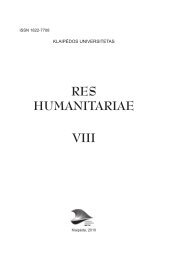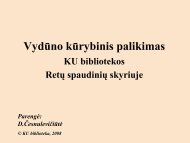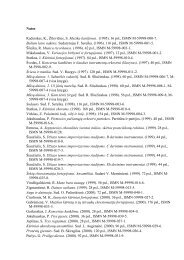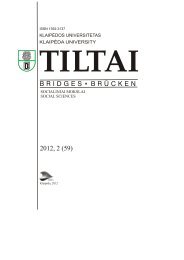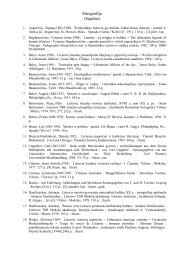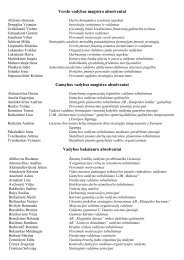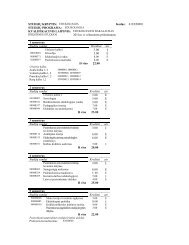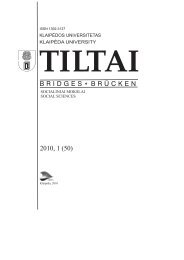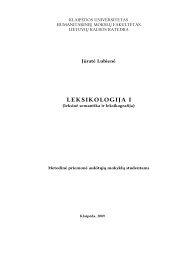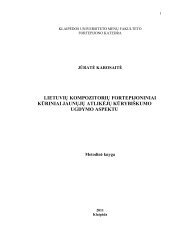You also want an ePaper? Increase the reach of your titles
YUMPU automatically turns print PDFs into web optimized ePapers that Google loves.
Hilmar Þór Hilmarsson<br />
States. The Baltic States could become a source of inspiration and encouragement for<br />
other lesser advanced transition countries and demonstrate to them what is possible to<br />
achieve in a relatively short time. The subject of this paper is to discuss how the Baltic<br />
States can best share their transition experience with other lesser advanced transition<br />
countries. This is not only a challenge for them but it is also a global challenge to find<br />
ways to utilize this experience for other countries seeking to advance their own transition<br />
and development and improve the living standards of their peoples.<br />
1. Partner countries and priority sectors<br />
The Baltic States have already initiated their international development cooperation.<br />
Multilaterally they are members of the World Bank Group (WBG) 1 and the<br />
European Bank for Reconstruction and Development (EBRD). 2 The Baltic States actively<br />
participate in the management of the WBG and share an executive director’s<br />
office with the Nordic countries 3 at the World Bank’s headquarters in Washington DC<br />
and have their advisors to the bank’s board. They also cooperate with the Nordic<br />
countries at the EBRD in London. At the EBRD, Estonia shares an office with Iceland<br />
and Sweden, Latvia works with Norway and Finland, and finally Lithuania cooperates<br />
with Denmark 4 (European Bank for Reconstruction and Development 2011). In addition<br />
to WBG and EBRD activities the Baltic States participate in and contribute to<br />
European Union programs and to the United Nations.<br />
All the Baltic States have initiated their bilateral development programs and have<br />
selected priority countries. Unlike the Nordic countries that primarily support low income<br />
countries in the south, especially in sub-Saharan Africa, the Baltic States have<br />
mainly chosen middle income countries in Europe and Central Asia 5 , see Table 1. In<br />
1 The World Bank was established in 1944, initially to support the reconstruction of Europe<br />
after the World War II. Now the World Bank is a source of financial and technical assistance to<br />
developing countries (low and middle income) around the world. World Bank Group consists<br />
of the following five institutions:<br />
i. International Bank for Reconstruction and Development, IBRD, 1944.<br />
ii. International Development Association, IDA, 1960.<br />
iii. International Finance Corporation, IFC, 1956.<br />
iv. Multilateral Investment Guarantee Agency, MIGA, 1988.<br />
v. International Centre for Settlement of Investment Disputes, ICSID, 1966.<br />
2 The European Bank for Reconstruction and Development (EBRD) is the first international financial<br />
institution of the post Cold War period. It was established in 1991 in response to major changes<br />
in the political and economic climate in Central and Eastern Europe. Inaugurated less than two years<br />
after the fall of the Berlin Wall, the bank was created to support the development of market economies<br />
in the region following the widespread collapse of communist regimes (European Bank for<br />
Reconstruction and Development 2011). EBRD now operates both in Europe and Central Asia.<br />
3 The Nordic countries are: Denmark, Finland, Iceland, Norway and Sweden.<br />
4 That group of countries also includes Ireland and FYR Macedonia.<br />
5 An exception to this rule is Afghanistan which is a low income country. Assistance to Afghanistan<br />
may be considered a special case for the Baltic States and related to their membership in NATO.<br />
2



